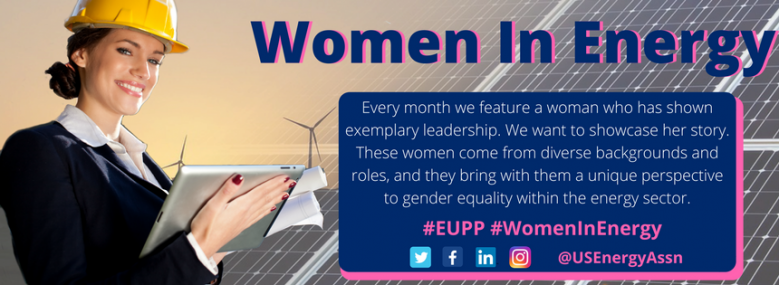
Women In Energy: Karen Alderman Harbert
The Women in Energy series is a joint project between USEA and USAID that was developed out of USEA’s Engendering Utilities Partnership, a program funded by USAID to improve gender policies and gender outcomes at their respective organizations.

Every month we feature a woman who has shown exemplary leadership. We want to showcase your story this month. The women among you come from diverse backgrounds and roles, and they bring with them a unique perspective to gender equality within the energy sector.

Karen Alderman Harbert is president and chief executive officer of the American Gas Association. Founded in 1918, AGA represents more than 200 local energy utility companies that deliver natural gas to 178 million Americans nationwide.
Prior to joining AGA, she was president and chief executive officer of the U.S. Chamber of Commerce’s Global Energy Institute (Energy Institute). Under Harbert’s leadership, the Energy Institute evolved into a premier national and international organization dedicated to advancing a constructive energy agenda with the business community, policymakers and consumers. Harbert led the Energy Institute’s development of its comprehensive Energy Works for US platform, which provides policy recommendations to secure our nation’s energy future and create millions of jobs, billions of dollars in revenue, and trillions of dollars of private investment. Under Harbert’s leadership, the Energy Institute established the groundbreaking Index of Energy Security Risk and the International Index of Energy Security Risk, the first tools to quantify America’s energy security on an annual basis. Harbert frequently testifies in front of Congress and provides analysis to the media, policymakers, and industry leaders.
Harbert is an appointed member of the National Petroleum Council, an industry advisory organization that advises the Secretary of Energy on issues related to the oil and gas industries.
Harbert is the former assistant secretary for policy and international affairs at the U.S. Department of Energy (DOE). She was the primary policy adviser to the secretary of energy and to the department on domestic and international energy issues. She negotiated and managed bilateral and multilateral agreements with other countries and also served as vice chairman of the International Energy Agency, which advises its 28 member nations on energy policy issues and orchestrates international responses to energy supply disruptions.
Prior to joining the DOE, Harbert was deputy assistant administrator for Latin America and the Caribbean at the U.S. Agency for International Development (USAID). She had oversight of programs in 11 countries, totaling more than $800 million and 1,000 employees. In the private sector, Harbert worked for over a decade developing international infrastructure and power projects valued at more than $9 billion in countries in the Middle East, Asia, and Latin America.
Harbert gained experience on issues associated with economic reform and privatization through earlier positions at the USAID, the Organization of American States, and the International Republican Institute. She received a degree in international policy studies and political science from Rice University in Houston, Texas.
Harbert resides in Washington, D.C., with her husband and two children.
*USEA does not alter the substance of the responses from the women featured. The answers are their own.
Women in Energy Interview Questions
How have your education and career path led you to where you are now?
"I studied international policy at Rice University in Houston where energy production and delivery looms large. I really wanted to pursue a career where I could make a difference rather than just have a job. And through a variety of interesting and very different opportunities and experiences, it has come true!
In my first few roles, I traveled all over the world and saw how energy is fundamental to the quality of life in a given area. Something as simple as having reliable electricity improves healthcare, safety and education. I was privileged to begin my career at the United States Agency for International Development (USAID) under President George H.W. Bush. I was given extraordinary opportunity and responsibility on the front lines of economic development. I went on to serve in the private sector, building large power plants to bring electricity to the developing world. I returned to public service with a number of positions in President George W. Bush’s administration including a second stint at USAID and as Assistant Secretary for Policy and International Affairs at the U.S. Department of Energy. Leading the U.S. Chamber of Commerce’s Global Energy Institute for ten years after that gave me a front-row seat to America’s shale revolution and the immense growth in our economy powered by affordable, abundant natural gas. I am excited to be leading the American Gas Association now at a time when so much of what we built during that prior decade is coming to fruition. New technologies are making natural gas safer and cleaner. Utilities are partnering with research institutions and private sector companies to use natural gas in new ways and customers and our environment are the true beneficiaries."
Over the course of your career, have you witnessed changes in the sector that have launched more women into leadership positions?
"This industry, and many others, have always had talented women who are capable and ready. I don’t think the prevalence of women in the leadership positions in 2020 is due to changes in the industry so much as the undeniable aptitude and determination of those individual women. One huge catalyst is that the women who have risen to the top are being open and honest about their experiences in the workplace. They are generous with their time when it comes to mentoring and coaching employees. That has inspired many more women to see themselves in leadership roles and want to pursue them."
Technology is transforming the traditional utility business model into a more modern interactive grid. Some utilities view this transformation as an opportunity to focus on change management and diversity. Research provides compelling evidence that inclusion and diversity unlock innovation and drives better business performance. What, if anything, is your organization doing to attract, retain, and promote more women into senior management positions to respond to the dramatic industry transformation?
"Technology has changed what we think of as a traditional utility employee and that has opened opportunities for everyone. We are training and hiring more cybersecurity professionals, data analysts, computer coders and economists than ever before. In some ways, natural gas utilities are now more in-line with other industries in that we are heavily invested in promoting STEM programs and supporting technical education at every level. Utilities are known for offering employees long and rewarding careers. A lot of attention is being paid in our industry to making sure that is still the case - maintaining a motivated and appreciated 21st century workforce."
Are talented women within your organization making it to top leadership positions? Why/why not?
"Yes, there is tremendous leadership by women at AGA and in the natural gas utility industry. More than 60 percent of AGA staff members are female. Women hold the top two positions in our organization, myself and our COO Lori Traweek. Six of the ten senior leadership positions at AGA are held by women. More than ten percent of our Board of Directors are women. These incredible leaders are not only role models for the thousands of women working their way up in our industry, but, frankly, they set an incredible example for their fellow managers and all utility employees."
Companies that embrace diversity outperform their competitors. What type of diversity programs does your organization have in place to mentor future women leaders? How does your organization measure and report gender diversity? Is the data publicly available?
"AGA runs a Next Level Leadership Women’s Program each year to complement current AGA member company programs. We bring together women from across the country who work in a variety of disciplines at natural gas utility companies to focus on growing as leaders and planning for their future."
What actions should the energy and electricity sector be focused on to accelerate change, increase diversity, and foster a better gender balance in the boardroom?
"We need greater balance on a number of fronts that align with the opportunities before us. We are seeing more boards looking for new perspectives and diverse expertise to add to their boards to complement the talents of more traditional board members like lawyers, accountants and engineers. Utilities also strive to have a leadership team that reflects their customers base. Employee recruitment, training, retention and satisfaction is a major focus for America’s natural gas utilities. I think we will see a diverse, talented and motivated crop of leaders guiding this industry for the next generation and beyond."
